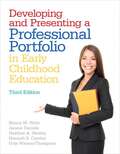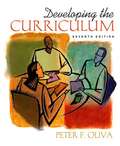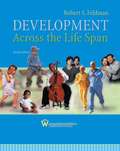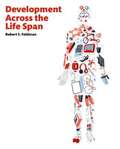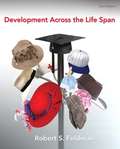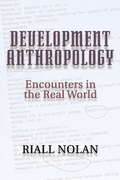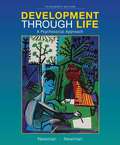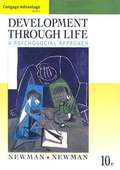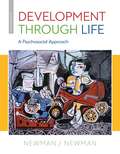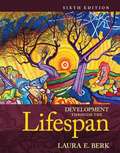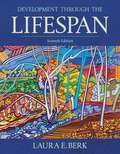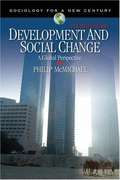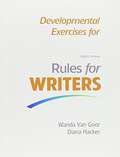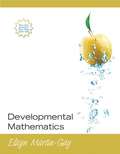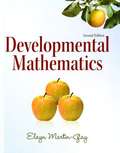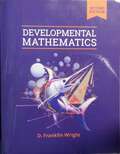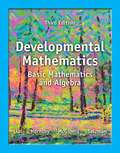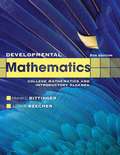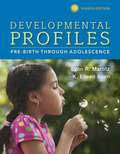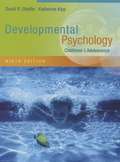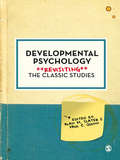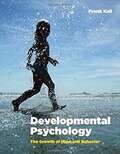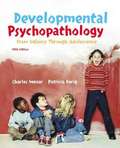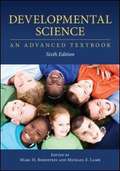- Table View
- List View
Developing and Presenting a Professional Portfolio in Early Childhood Education
by Janese Daniels Nancy W. Wiltz Heather Skelley Hannah S. Cawley Ocie Watson-ThompsonThis book is a must-have handbook for all early childhood education major preparing their professional portfolio for scholarly review and job placement. In ten straightforward and user-friendly chapters, Wiltz et. al.'s supplemental textbook instructs the student on what items to collect for the portfolio, how to compile/construct/label it, and then how to talk about it/present it. <p><p> Readers will journey from learning the reasons behind developing a professional portfolio clear through completion of a final product. The authors present the topic to readers via a successful step-by-step process of developing, self-evaluating, and presenting a professional early childhood education portfolio. <p><p> Each chapter has a definitive goal and will guide the reader that much closer to the end goal-that of a portfolio ready to present in interviews and utilize in the working classroom. Although the premise of the text is based on the platform the authors have implemented to support their own student interns going through the portfolio process at Towson University, this manual has a widely universal appeal for all students in a wide-range of early childhood programs as they develop their professional portfolio from just the beginnings through the final presentation. <p><p> The text is appropriate for programs for which the portfolios are started in the Introduction to Early Childhood course and compiled as students make their way through the programs; or when the portfolio process is introduced in a Curriculum course, for instance; and for the Student Teaching, Practicum, or Capstone course.
Developing the Curriculum
by Peter F. OlivaThis highly readable text guides students step-by-step through the process of curriculum development, providing a solid foundation of key models and concepts and issues pertaining to curriculum today. Developing the Curriculum, Seventh Edition, full of references to classic and contemporary curriculum works, provides students with a synthesis of historic and contemporary principles and practices associated with creating an effective curriculum. In addition, the author introduces a model that combines curriculum and instruction and carefully explores issues and challenges at each stage.
Development Across The Life Span
by FeldmanThis chronologically organized book provides readers with a broad overview of the field of human development--from the moment of conception through death--focusing on physical, cognitive, and social and personality development. Appealing to individuals with a myriad of different backgrounds and future goals, this book offers the most current, balanced coverage of theory and research. A wide variety of chapter topics includes gene therapy; brain development, post-partum depression; child care effects; home schooling; cognitive developments, stability of personality; cultural approaches to development, and attitudes toward aging and length of life. For a better understanding of the experiences of life and development of humans.
Development Across The Life Span (Eighth Edition)
by Robert S. FeldmanA compelling blend of lifespan development research and applications Development Across the Life Span provides a chronological overview of human development from the moment of conception through death, examining both the traditional areas of the field and more recent innovations. Author Robert Feldman focuses on how developmental findings can be can be applied meaningfully and practically, helping students to recognize the relevance of the discipline to their own lives. Thoroughly updated with the latest data and contemporary examples, the Eighth Edition better engages students in key concepts via recent news items, timely world events, and contemporary uses of lifespan development. Personalize learning with MyPsychLab MyPsychLab is an online homework, tutorial, and assessment program designed to work with this text to engage students and improve results. Within its structured environment, students practice what they learn, test their understanding, and pursue a personalized study plan that helps them better absorb course material and understand difficult concepts.
Development Across the Life Span (Sixth Edition)
by Robert S. FeldmanRobert Feldman offers students a chronological overview of physical, cognitive, social, and emotional development-from conception through death with his text Development Across the Lifespan . The text presents up-to-date coverage of theory and research, with an emphasis on the application of these concepts by students in their personal-and future professional-lives. The text taps into students' inherent interest in the subject of human development, encouraging them to draw connections between the material and their own experiences. This book is available with MyDevelopmentLab, which includes a full eText, videos, self-tests, flashcards, and MyVirtualChild- the interactive simulation which allows you to raise a virtual child from birth to age 18, and monitor the effects of your parenting decisions. MyDevelopmentLab does not come automatically with the text so please be sure you check to ensure that an access code is included before placing your order! (The book by itself has a different ISBN number than the book + MyDevelopmentLab. ) You can also purchase a MyDevelopmentLab access code online at www. mydevelopmentlab. com Visit the Feldman preview website to view a sample chapter! www. pearsonhighered. com/showcase/feldman What to know more? Click here to visit the publisher's website and learn more about this book and what's new in this 6th edition: http://www. pearsonhighered. com/educator/product/Development-Across-the-Life-Span/9780205805914. page
Development Anthropology
by Riall NolanDevelopment Anthropology is a detailed examination of how anthropology is used in international development projects. Written from a practitioner's standpoint, and containing numerous examples and case studies, the book aims to provide students with a comprehensive overview of what development anthropologists do, how they do it, and what problems they encounter in their work. The first part of the book looks at the evolution of both applied anthropology and international development, and how these have been involved with each other since the 1950s. The second, and main, part of the book focuses on how development projects work, and how anthropology is used in their design, implementation, and evaluation. The final section of the book looks at how both development and anthropology must change in order to be more effective. An appendix outlines what students should do to plan a career in development anthropology.
Development Of Prototype Tactile Instructional Materials In High School Geometry For Students With Vision Loss
by Allan Rosal MesogaResearcher: Allan Rosal Mesoga Title of Thesis: Development of Prototype Tactile Instructional Materials in High School Geometry for Students with Vision Loss Degree: Master of Arts in Education Specialization: Special Education (Teaching Children with Visual Impairment) Institution: College of Graduate Studies Philippine Normal University Advisers: Julieta A. Gregorio, Ph.D. Rosemarievic Villena-Diaz, Ph.D. Key Concepts: High School Geometry, Competencies, Vision Loss, Tactile Materials The purpose of this study is to develop prototype tactile instructional materials in High School Geometry for students with vision loss. Specifically, this study aimed to Develop and Content Validate the Prototype Tactile Instructional Materials in High School Geometry for Students with Vision Loss. To accomplish this, the study sought to achieve six objectives: (1) Analyze the content of the geometry skills in the Basic Education Curriculum (BEC) from kindergarten, from elementary up to secondary school, to determine their prerequisites, sequences, and levels of difficulty, (2) Analyze literature on mathematics tactile materials in advanced countries, (3) Identify the adaptations and modifications that can be incorporated into locally constructed materials for teaching geometry skills to blind students with vision loss in secondary school, (4) Develop prototypes of tactile instructional materials for selected geometry skills in the secondary school curriculum, (5) Establish the content validity of the prototype tactile instructional materials, and (6) Revise the prototype materials as needed and prepare the final tactile instructional materials for learners with visual loss in secondary school. The research for this study was carried out in two stages. The first stage focused on data gathering as well as on the preparation and validation of prototype tactile instructional material in geometry for students with vision loss. In the second stage, the prototype tactile instructional materials were revised, and the final copy of prototype tactile material was prepared. There are two (2) groups of respondents in this study. The first group consists of two (2) mathematics professors, one (1) special education professor, and one (1) special education teacher. Thus, the first group of respondents is made up of four (4) teachers, or experts. This group established the content validity of the prototype tactile instructional material in terms of the competencies set by the Department of Education. The second group of respondents is made up of nine (9) students with vision loss. This group established the content validity of the prototype tactile instructional material in Geometry as instructional materials for students with vision loss. The first group of respondents used the five (5) criteria for evaluating the prototype tactile instructional materials as adapted from the study of Cadiente (2006).
Development Through Life: A Psychosocial Approach
by Barbara Newman Philip NewmanHuman development is fascinating. This text uses a life-stage approach to present development across the life span, drawing on the psychosocial theory of Erik Erikson to provide a conceptual framework. The authors address physical, intellectual, social, and emotional growth in 11 life stages, from the prenatal period through elderhood, focusing on the idea that development results from the interdependence of individuals and their environments at every stage, and placing special emphasis on how optimal development may be fostered throughout life. They also provide many cases that show you how research and theories can be applied to contemporary issues, the diversity of experiences that are possible at a certain period of life, and how people cope with challenges they face at various points in life.
Development Through Life: A Psychosocial Approach (10th edition)
by Barbara M. Newman Philip R. NewmanDesigned for an undergraduate course in human development, this textbook describes the physical, intellectual, social, and emotional growth that occurs in each of 11 life stages. Its psychosocial approach emphasizes the continuous interaction and integration of individual competencies with the demands and resources of the surrounding culture. The ninth edition features a new chapter on death, dying, and bereavement. A glossary of terms completes the volume.
Development Through Life: A Psychosocial Approach (Twelfth Edition)
by Barbara M. Newman Philip R. NewmanNewman and Newman use a chronological approach to present development across the life span, drawing on the psychosocial theory of Erik Erikson to provide a conceptual framework for the text. The authors address physical, intellectual, social, and emotional growth in all life stages, focusing on the idea that development results from the interdependence of these areas at every stage, and placing special emphasis on optimal development through life.
Development Through the Lifespan (6th Edition)
by Laura E. BerkLaura Berk's Development Through the Lifespan is relied upon in classrooms worldwide for its clear, engaging writing style, exceptional multicultural and cross-cultural focus, cutting-edge consideration of the interrelationships between heredity and environment, rich examples, and long-standing commitment to presenting the most up-to-date scholarship. This new edition continues to offer students research-based practical applications that they can relate to their personal and professional lives. Laura Berk, renowned professor and researcher, has revised the text with new pedagogy, a heightened emphasis on the interplay between heredity and environment, and an enhanced focus on many social policy issues, while emphasizing the lifespan perspective throughout. The latest theories and findings in the field are made accessible to students in a manageable and relevant way. Berk's signature storytelling style invites students to actively learn beside the text's "characters." Students are provided with an especially clear and coherent understanding of the sequence and underlying processes of human development, emphasizing the interrelatedness of all domains--physical, cognitive, emotional, social--throughout the text narrative and in special features. Berk also helps students connect their learning to their personal and professional areas of interest. Her voice comes through when speaking directly about issues students will face in their future pursuits as parents, educators, health care providers, social workers, and researchers. As members of a global and diverse human community, students are called to intelligently approach the responsibility of understanding and responding to the needs and concerns of both young and old. While carefully considering the complexities of human development, Berk presents classic and emerging theories in an especially clear, engaging writing style, with a multitude of research-based, real-world, cross-cultural, and multicultural examples. Strengthening the connections among developmental domains and of theory and research with applications, this edition's extensive revision brings forth the most recent scholarship, representing the changing field of human development.
Development Through the Lifespan: 7th Edition
by Laura E. BerkUnparalleled Among Human Development Texts — In a Class by Itself <P><P>With its seamless integration of up-to-date research, strong multicultural and cross-cultural focus, and clear, engaging narrative, Development Through the Lifespan has established itself as the market’s leading text. The dramatically revised Seventh Edition presents the newest, most relevant research and applications in the field of human development today. Featuring compelling topics, rich examples, and author Laura Berk’s signature storytelling style, this new edition is the most current and engaging text available. <P><P>Available to package with Development Through the Lifespan, Seventh Edition, MyLab™ Human Development is an online homework, tutorial, and assessment program designed to work with this text to further engage students and improve learning. MyLab Human Development is ideal for courses requiring robust assessments. <P><P>Development Through the Lifespan, Seventh Edition is also available via Revel™, an interactive digital learning environment that is a less expensive alternative to the print textbook, enabling students to read, practice, and study in one continuous experience. Revel’s new mobile app lets students access and interact with their text anywhere, anytime, on any device, giving students the flexibility of toggling between their phone, tablet, and laptop as they move through their day.
Development and Social Change: A Global Perspective (4th Edition)
by Philip McmichaelThis edition describes the dramatic acceleration of the global and political economy across three historical periods: colonialism, the development era, and the current era of globalization. Filled with case studies, this text makes the intricacies of globalization concrete, meaningful, and clear for students and moves them away from simple social evolutionary views, encouraging them to ponder social change, development, and global inequalities.
Developmental Exercises For Rules For Writers
by Diana Hacker Nancy SommersTo learn any skill--whether snowboarding, tennis, CPR, Web design, or the electric guitar--takes practice. Writing well is no exception: In a college composition class, you will learn to write by writing, and you will learn to revise by revising. Developmental Exercises for Rules for Writers, Eighth Edition, will sharpen your revision skills by giving you a great deal of controlled, yet realistic, practice.
Developmental Mathematics
by K. Elayn Martin-GayDevelopmental Mathematics is a new addition to the Martin-Gay work text series and is intended for a 2-3 semester sequence of Basic Math,Introductory Algebra and Intermediate Algebra. The text provides complete coverage for basic mathematics and introductory algebra courses and with the appendices ("further topics in algebra") it provides the necessary intermediate algebra topics. The Whole Numbers; Multiplying and Dividing Fractions; Adding and Subtracting Fractions; Decimals; Per¢ Geometry; Statistics and Probability; Real Numbers and Introduction to Algebra; Equations, Inequalities, and Problem Solving; Graphing Equations and Inequalities; Systems of Linear Equations; Exponents and Polynomials; Factoring Polynomials; Rational Expressions; Roots and Radicals; Quadratic Equations and Nonlinear Graphs; Further Algebraic Topics; Tables; The Bigger Picture; Further Geometric Topics; Inductive and Deductive Reasoning; Sample THEA Test For all readers interested in developmental mathematics.
Developmental Mathematics (Second Edition)
by Elayn Martin-GayElayn Martin-Gay firmly believes that every student can succeed, and her developmental math textbooks and video resources are motivated by this belief. Developmental Mathematics, Second Edition was written to help readers effectively make the transition from arithmetic to algebra. The new edition offers new resources like the Student Organizer and now includes Student Resources in the back of the book to help students on their quest for success.
Developmental Mathematics 2e Textbook And Software Bundle
by Hawkes LearningDevelopmental Mathematics 2e Textbook
Developmental Mathematics: Basic Mathematics And Algebra
by Margaret L. Lial John Hornsby Stanley Salzman Diana Hestwood Terry McGinnisThe Lial Series has helped thousands of students succeed in developmental mathematics by providing the best learning and teaching support to students and instructors.
Developmental Mathematics: College Mathematics and Introductory Algebra (8th Edition)
by Marvin L. Bittinger Judith A. BeecherThe Bittinger series changed the face of developmental education with the introduction of objective-based work texts that presented math one concept at a time. This approach allowed readers to understand the rationale behind each concept before practicing the associated skills and then moving on to the next topic. With this revision, Marv Bittinger continues to focus on building success through conceptual understanding, while also supporting readers with quality applications, exercises, and new review and study materials to help students apply and retain their knowledge.
Developmental Profiles: Pre-Birth Through Adolescence (Eighth Edition)
by Lynn R. Marotz K Eileen AllenDesigned to help you comprehend the complexity of child development, DEVELOPMENTAL PROFILES: PRE-BIRTH THROUGH ADOLESCENCE, Eighth Edition, highlights major characteristics for each of the developmental domains in a concise, non-technical, point-by-point format. The book covers the full range of stages in child and adolescent development, highlighting important safety considerations at each developmental stage. This edition provides extensive information that teachers, families, and service providers will find useful for promoting individualized learning and identifying developmental delays in their earliest stage. It integrates current research and theory throughout, and emphasizes the importance of working collaboratively with diverse families to achieve maximum benefit for children. Both preservice and practicing teachers will turn to this excellent reference over and over again for comprehensive, easy-to-find information about each stage of development.
Developmental Psychology: Childhood And Adolescence (Ninth Edition)
by David R. Shaffer Katherine KippThis popular, topically organized, and thoroughly updated child and adolescent development text presents you with the best theories, research, and practical advice that developmentalists have to offer today. Authors David R. Shaffer and Katherine Kipp provide you with a current and comprehensive overview of child and adolescent development, written in clear, concise language that talks "to" you rather than "at" you. The authors also focus on application showing how theories and research apply to real-life settings. As a result, you will gain an understanding of developmental principles that will help you in your roles as parents, teachers, nurses, day-care workers, pediatricians, psychologists, or in any other capacity by which you may one day influence the lives of developing persons. Available with InfoTrac Student Collections http://gocengage. com/infotrac.
Developmental Psychology: Revisiting the Classic Studies (Psychology: Revisiting the Classic Studies)
by Alan M. Slater Paul C. QuinnThis book revisits classic studies in developmental psychology with a view to showing not only how they shaped the field, but also how the field has itself moved on through engagement with the issues these studies raise. It engages critically with the studies in order to reveal new ways of thinking both about them and about the ideas they explore. In effect, it shows how developmental psychology can be - and has been - taken forward in exciting ways through a careful re-examination of the core studies that lie at its heart.<P><P> The volume's chapters are written by internationally renowned scholars who are working at the cutting edge of the areas mapped out by particular classic studies and whose work has been heavily influenced by a deep appreciation of the research that they write about. As a result, the chapters give readers profound insights into the foundations of developmental psychology, but also show how the discipline has advanced in important ways in the years since those studies were conducted.<P> Written in an accessible and engaging style, each chapter uses a similar structure to explore a particular classic study and the topic it relates to. All the chapters start by locating the studies within their social and historical context - identifying the concerns that motivated researchers, and the particular perspective that informed their scientific thinking. The studies' methods and findings are then presented. This is followed by a discussion of the studies' impact, before concluding with a consideration of the way in which, from the time that they were conducted, the field has moved beyond the classic studies. The result is a volume which is not only enjoyable and informative to read, but one that should support developmental psychology courses at any level.
Developmental Psychology: The Growth of Mind and Behavior
by Frank KeilClear, compelling, and authoritative. <p><p> Frank Keil’s Developmental Psychology represents his vision of how psychology should be taught and is based on nearly four decades of teaching a lecture course in developmental psychology and conducting developmental research. <p><p>With a cohesive narrative, clear art program, and carefully crafted pedagogy, the book guides students through material that is as rich as it is intriguing. Keil’s narrative reflects his passion for engaging students’ intellectual curiosity with an analytical approach that explores the big questions, links theory with evidence, and treats developmental psychology as a science. <p><p>Developmental Psychology invites readers to celebrate the beauty and to understand the depth of psychological development.
Developmental Psychopathology (Fifth Edition)
by Charles Wenar Patricia KerigThis accessible, clearly written text approaches child psychopathology as "normal development gone awry" and encourages students to "think developmentally" about psychopathology, from childhood through adolescence. The fifth edition includes cutting-edge research, improved organization, and new coverage of problems that arise in late adolescence/early adulthood.
Developmental Science: An Advanced Textbook,
by Marc H. Bornstein Michael E. LambNoted as one of the most comprehensive textbooks in the field, Developmental Science, 6th Edition introduces readers to all of areas in developmental psychology: neuroscience, genetics, perception, cognition, language, emotion, self, and social interaction. Each of the world-renowned contributors masterfully introduces the history and systems, methodologies, and measurement and analytic techniques used to understand the area of human development under review. The relevance of the field is illustrated through engaging applications in each chapter. As a whole, this highly-respected text illuminates substantive phenomena in developmental science, its applications across the life span, and its relevance to everyday life. Each chapter has been substantially revised for this new edition to reflect the current state of the field and the new edition is now accompanied by a website. Students and instructors will find chapter outlines, topics to think about before reading the chapters, a glossary, and suggested readings with active reference links on the website. Electronic access to the text's figures and tables, suggestions for classroom assignments and/or discussion, and a test bank with multiple-choice, short answer, and essay questions is limited to instructors only. Two new chapters highlight many modern developments. Each chapter features an introduction, up-to-date overviews of the field, summary and conclusion, and numerous classical and contemporary references. The book opens with an overview of developmental science -- its history and theory, the cultural orientation to thinking about human development, and the manner in which empirical research is designed, conducted, and analyzed. Part 2 focuses on the field's major substantive areas: neuroscience and genetics, physical and motor skills, perception, and cognitive and language development. Part 3 examines personality and social development within the context of the various relationships and situations in which developing individuals function and by which they are shaped. The book concludes with a new chapter on the latest applications of developmental science. Ways in which developmental thinking and research affect and are affected by practice and social policy are particularly emphasized. Used primarily as a graduate level text for courses on developmental psychology/science, life span, and/or human development, the book can also be used at the advanced undergraduate level. Researchers interested in staying abreast of the latest developments in the field also appreciate the book's comprehensive nature.
